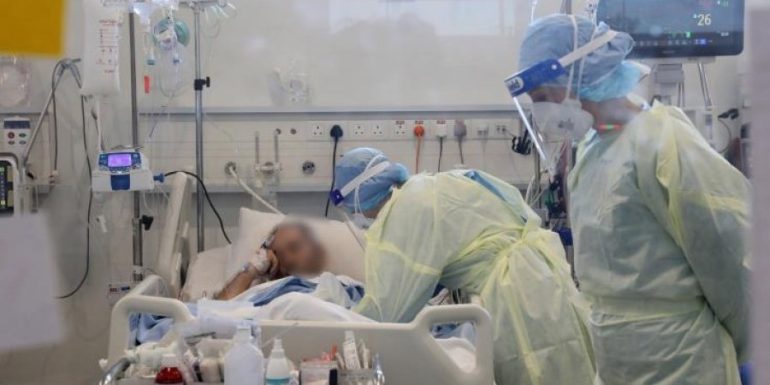There is a possibility that the health system in Cyprus will be further burdened by the high transmissibility of the new Omicron variant, said the Assistant Professor of Pediatrics and Infectious Diseases at the University of Cyprus, Dr. Maria Koliou, who notes that according to the estimates of the Advisory Scientific Committee, the 5th wave of the pandemic is expected to peak in the 2nd or 3rd week of January.
Ms. Koliou, a member of the Advisory Committee of the Ministry of Health, estimates that the higher transmissibility and the high number of cases recorded by Omicron, together with the fact that part of the transmissibility comes from the Delta mutation, can burden and pressure the health system of Cyprus.
However, he emphasizes that the rate of vaccination coverage in Cyprus is high and plays an important role in the state of the health system as it develops.
Asked if Omicron's higher transmissibility could have an impact on the health system, ie more pressure, Ms. Koliou said "it certainly can. "Because if we assume that it has a part of Delta contagion and the fact that it has too many cases, much more than Delta, it can burden the health system."
He explained that the arrival of Omicron "has succeeded in a phase in which our system is already burdened with incidents from the Delta", adding that "there is a possibility that the systems will be further burdened".
He also noted that the vaccine factor should be taken into account, explaining that the season we are going through is not the same as last year.
"Certainly," he said, "we are in a situation where we have an average to high rate of vaccination coverage. We are already comparing favorably with other EU countries for the coverage rate and I would especially emphasize the 3rd installment rate, which would encourage people who are entitled to the 3rd installment to go and do it ".
He stressed that "it is clear that the 3rd dose protects very effectively from serious illness with Omicron", adding that "even the 2nd dose - if not more than 6 months have passed - has a significant protection to offer".
In relation to the issue of hospitalizations with Omicron, Dr. Koliou said they will have more information next week.
"We know that there is always a latent time from the moment cases increase in the community to the increase in hospital admissions. "Therefore, we will have the next few days to see this," he said.
He also referred to the positive experience recorded in the United Kingdom, saying that "there is also a highly vaccinated population and they have seen that although the incidence of the disease has increased dramatically, it seems that there has been no significant burden on the health system in relation to imports. in hospitals ".
He stressed that "their secret there, apart from the fact that the mutation is milder, is that they have a very high vaccination coverage", to note that "in Cyprus we have an enviable vaccination coverage, which must be further strengthened".
Recession of high case numbers
Asked to estimate when the 5th wave of the pandemic peaks, Dr. Koliou stated that "the estimates of the Advisory Scientific Committee are that the 5th wave peaks during the 2nd or 3rd week of January".
"In the 2nd or 3rd week of January, we expect the wave to reach its peak and from there on, there will probably be a recession and a reduction of very high cases," he said specifically.
None new to the mutation from Cameroon
Asked if there are any recent data on the mutation from Cameroon, Dr. Koliou said that what they know at the moment "is that there are several mutations from this particular strain", however, he noted that so far because several of them do not relate to the spike protein, which has to do with transmission, it seems that the transmission is smaller than Omicron ".
He explained that transmissibility is one of the most important factors in determining the prevalence of a mutation.
Noting that the mutation from Cameroon was detected in November and is currently found in only 15 people in France, the Assistant Professor of Pediatrics and Infectious Diseases at the University of Cyprus said "indeed. "This is another element that shows reduced transmission."
He added that "for now we should not worry", to add, however, "this particular virus is accustomed to many surprises, so no one can be absolutely sure."
No case of Influenza A in Cyprus so far
Asked if flu cases have been reported in Cyprus, he said there have been no cases in Cyprus yet, adding that Influenza A in Cyprus usually occurs in the first week of January or the last week of December.
"In other countries there is a mixed wave of Influenza and in fact cases have been reported in which the flu viruses coexisted and COVID-19. It is something we want to avoid. "It is not good for both viruses to coexist in the body," he explained.
